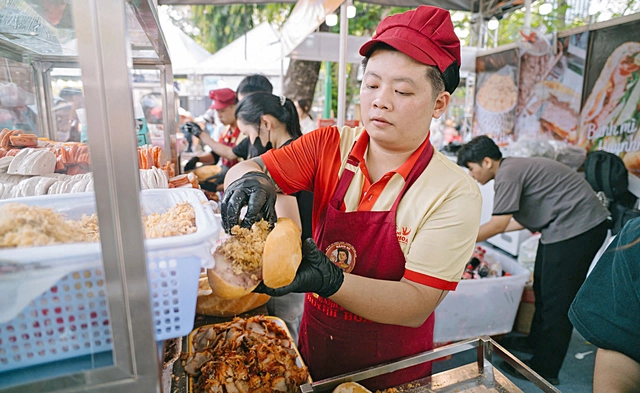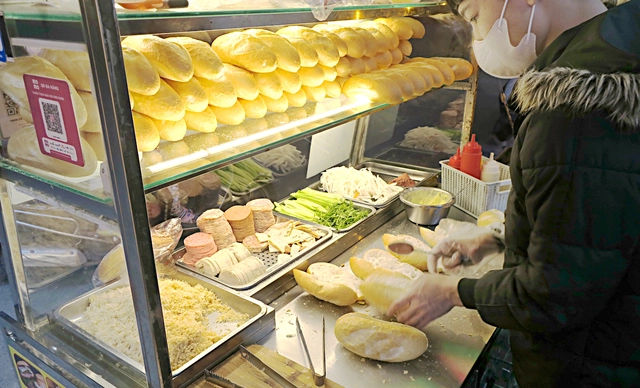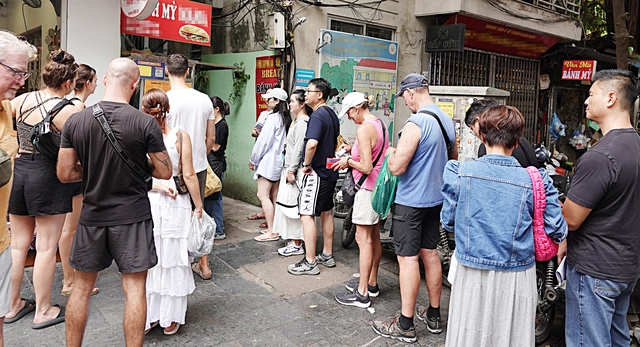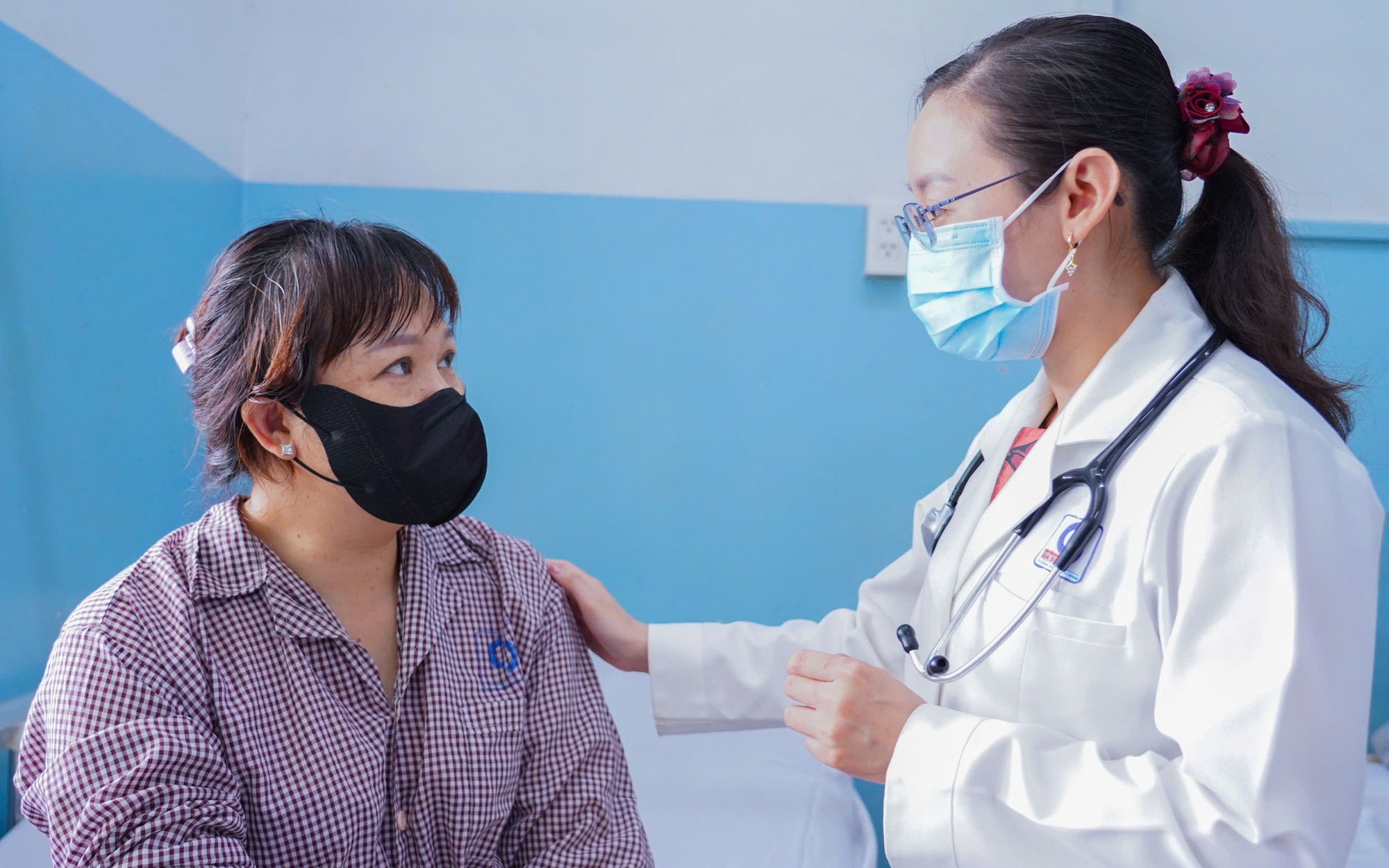
Vietnam’s beloved ‘banh mi’ under scrutiny after latest mass food poisoning
More than 300 people have fallen ill after eating ‘banh mi’ from two outlets of the same vendor in Ho Chi Minh City, the latest in a series of food-poisoning outbreaks linked to the popular Vietnamese sandwich.

A worker prepares an oversized, fully loaded ‘banh mi’ sold by Huynh Hoa, a popular stall featured at the 2024 Banh Mi Festival in Ho Chi Minh City, Vietnam. Photo: Thanh Hiep
The incident has renewed debate over food-safety standards in the country's fast-growing street-food economy, with experts warning that risks often originate long before the sandwich reaches the point of sale.
Risks beyond the stall
Food-safety specialists say ‘banh mi’ sellers typically rely on multiple outside suppliers for fillings such as pâté, cold cuts, pickles and butter — ingredients that can spoil easily if poorly sourced or mishandled.
Vo Duc Minh, who runs a bread production facility in Binh Quoi Ward, Ho Chi Minh City, said his business supplies thousands of baguettes each day and produces pâté on request.
While bread made from wheat flour and baked at high temperatures is relatively safe, he said pâté made from pork liver can become hazardous if the raw ingredients are substandard or stored improperly.
Minh said many sellers buy pâté in bulk to save on delivery costs and use it over several days.
He noted that producers cannot control how vendors store or handle ingredients after purchase.
Nguyen Thi Thu Bao, a ‘banh mi’ vendor in Sai Gon Ward, said a typical sandwich includes five or six ingredients, often sourced from different suppliers.
That fragmentation makes tracing contamination difficult when outbreaks occur.
She said producers of pâté or cold cuts often supply "dozens, sometimes hundreds" of small shops, and when problems arise, responsibility must be shared.

A worker prepares a ‘banh mi’ at a shop in Vietnam. Photo: T.T.D. / Tuoi Tre
Industry calls for stricter controls
Manufacturers say branded, packaged ‘banh mi’ products that carry labeling, expiry dates and cold-chain requirements generally face stricter oversight compared with small stalls.
Phan Van Thien, deputy general director of confectionery brand Bibica, said industrial bakeries must keep bread refrigerated, use vetted suppliers and conduct regular sample testing.
He said ingredients such as pâté, shredded pork and butter require particularly tight control, and that accountability should extend to suppliers whose products are used by many vendors.
Clear sourcing, he added, forces producers to maintain higher standards.
Consumer advocates warn that sellers face closure, compensation claims and potential legal consequences if their food causes illness.
They urge buyers to keep receipts and report unhygienic stalls.
A representative of a Ho Chi Minh City food-export company said many countries impose heavy penalties for safety violations, prompting producers to monitor each other closely.
If ingredient origins are unclear, the representative said, authorities should shut the facility.
A system still reacting rather than preventing
Nguyen Van Binh, who runs a major ‘banh mi’ business in Ho Chi Minh City, said recurring outbreaks show weaknesses in how food-safety rules are enforced.
He said inspections are often reactive, triggered only after a problem emerges.
Without stronger oversight of supply chains, he warned, outbreaks will continue.
Food experts say authorities must target the root of the supply chain — the factories producing pâté, cold cuts or broths — because a single unsafe supplier can affect hundreds of vendors.
The city's Food Safety Department said it conducts routine and ad-hoc inspections and will step up oversight of high-risk ingredients including pâté, cold cuts, butter and pickled vegetables.
Recent outbreaks have included more than 300 cases linked to a Hoi An shop in September 2023, nearly 600 cases and one death in Dong Nai Province in May 2024, more than 300 cases in former Ba Ria–Vung Tau Province in November 2024 and over 300 cases in Ho Chi Minh City last week.

Tourists queue to buy ‘banh mi’ at a shop in Hanoi, Vietnam. Photo: T.T.D. / Tuoi Tre
Health officials say such incidents typically involve pathogens such as Staphylococcus aureus, Salmonella, Shigella, E. coli, Clostridium perfringens and Bacillus cereus.
They caution against drawing conclusions from isolated test results and say full laboratory and epidemiological analysis is needed.
The city's Health Department urged the public to choose food with clear origins, eat freshly cooked meals and store food properly.
Reputation at stake
The fallout extends beyond public health.
Nguyen Thi Khanh, chairwoman of the Ho Chi Minh City Tourism Association, said official food festivals enforce strict safety criteria, requiring participants to show hygiene certificates, maintain clean equipment and use ingredients with clear origins.
She said outdoor festival settings are inherently more vulnerable to contamination, making rigorous controls essential.
Khanh warned that high-profile outbreaks can damage Vietnam's international image.
"‘Banh mi’ is one of Vietnam's most recognized foods," she said.
"These incidents affect not only consumer health but also the country's reputation."
Bao Anh - Nguyen Tri - X. Mai / Tuoi Tre News
Link nội dung: https://news.tuoitre.vn/vietnams-beloved-banh-mi-under-scrutiny-after-latest-mass-food-poisoning-103251115152220757.htm
